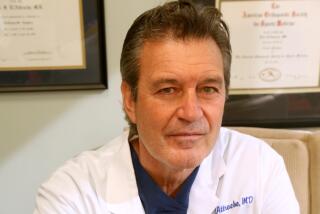Polk Playing Football After Medical Miracle
- Share via
BUFFALO, N.Y. — On that first dreadful night after he broke his neck playing football, JoJo Polk lay in a hospital bed crying, feeling sorry for himself, paralyzed below the waist.
“The first night, terrible. I was praying I’d die right there on the spot,” Polk recalls. “One day I’m running and doing everything I love to do, and the next thing, I’m laying in a bed, which could be my life.”
That was three years ago, and Polk’s life has turned out far better than he, or anyone, could have imagined.
Walking three months after he was hospitalized, Polk’s now in his third season playing in the Arena Football League as a defensive back with the Buffalo Destroyers. He’s sixth in the league with 70 tackles with two games remaining.
Called “a medical miracle,” he has defied the odds and proved wrong the doctors, friends, family, and even himself -- everyone who assumed he would spend the rest of his days in a wheelchair.
“You can say my story was like a storybook,” Polk said.
Just ask Destroyers trainer Greg Bean, who extensively studied Polk’s history and cleared him to play when he arrived in Buffalo as a free agent last winter.
“When you write the story, people won’t believe it. But it’s true,” Bean said. “He’s defied every possible medical reasoning and protocol.”
Polk grew up in Lawrence, Kan., and played at Division II Northeastern State in Oklahoma. In 2000, he was pursuing his lifelong dream of playing professional football as a rookie with the Tulsa Talons in Arena Football League 2.
Going to break up a pass, Polk tripped over a fallen receiver and slammed headfirst into the padded wall that lines the field. The impact broke his C-6 vertebra, leaving him paralyzed, unable to move his legs and temporarily without feeling in his hands.
At first, doctors said he’d be lucky to brush his teeth one day.
As he considered continuing athletics in the Special Olympics, Polk never relinquished the belief he’d fully recover.
His hopes were bolstered by his mother, Cyrese Powell, who suffered a similar injury in a car accident 12 years earlier. She was walking a little more than two years later.
“You’ve got top-notch doctors saying, ‘Well, you’ll probably never walk again.’ That kind of sits in your head,” Polk said. “But my mom always said, ‘Doctors aren’t always right.”’
Powell, whose range of motion is still limited, credits her recovery to willpower, not wanting to raise three young children while bedridden.
She can’t explain what happened to her son.
“It’s just a fluke of nature,” Powell said. “I don’t know anybody but God that could have healed him the way he did.”
A few weeks after Polk was hurt, he felt a twitch in his legs. Three months later, he was walking. A month after that, without telling his doctors, he felt strong and confident enough to play flag football.
A year after he was hurt, Polk was helping Grand Rapids win the Arena Bowl title, capping his season by making the league’s all-rookie team.
There are about 200,000 Americans living with spinal cord injuries, according to the National Spinal Cord Injury Statistical Center at the University of Alabama-Birmingham. Of those, 28 percent walk again, usually with the help of a brace or cane.
What helped Polk was that doctors elected against surgery. He was fitted for a halo, a large brace screwed into his head, that barred movement and allowed the break to heal naturally.
Except for a few faint scars from the screws, Polk shows no hint of being hurt.
Lean and muscular at 5-foot-11, 180 pounds, Polk is tenacious and quick, able to close gaps and fearless in making tackles, even along the sidelines.
Covering a receiver cutting across the middle during a recent practice, Polk got his hand up to break up the pass. His momentum carried him headfirst into the air-padded wall.
He casually got up and jogged back to the huddle.
“That’s how I play,” said Polk, adding he never thinks back to how he was hurt and never wants to see a replay. “You’ve got to move on. And I think watching it might scare me in a way. You get close to a wall and clench up or something.
“I don’t have time to do that, especially the position that I play.”
According to Bean, Polk is physically no more likely to sustain the same injury than another player because, unlike muscles or cartilage, bones can fully heal.
“The only way he’s more likely is because of how he plays,” Bean said, smiling.
Polk, who is deeply religious, doesn’t know how to explain his recovery.
“Lucky is a word that I don’t really know what it means,” he said. “Blessed, I do. I know a lot of prayers went up for me. And here I am.”
And Polk, 25, hasn’t given up hope he’ll one day get a tryout with an NFL team. He believes he’s done enough over the past three seasons to show there’s nothing to fear.
“All I can do is keep working hard out here and hope they’ll see that there is no liability,” Polk said, pausing, “and that I’m here to stay.”
More to Read
Go beyond the scoreboard
Get the latest on L.A.'s teams in the daily Sports Report newsletter.
You may occasionally receive promotional content from the Los Angeles Times.










